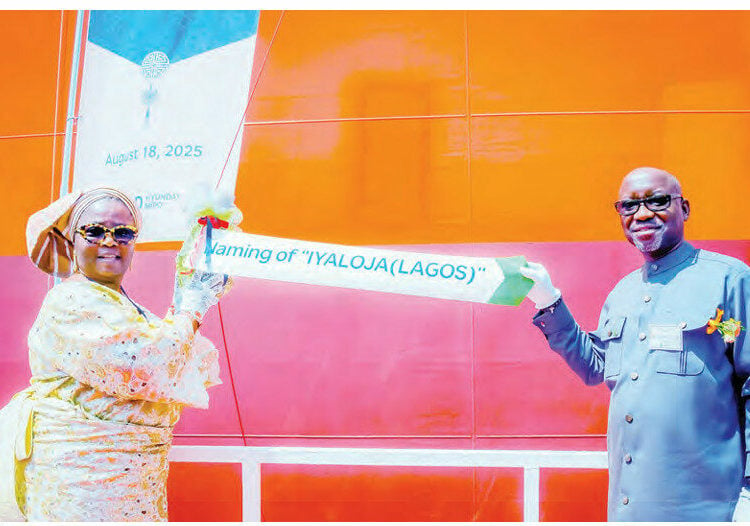
Residents of the Federal Capital Territory (FCT), Abuja have once again been availed the opportunity to convert their vehicles to Compressed Natural Gas (CNG) at affordable prices and premium availability through the partnership between the National Agency for Science and Engineering Infrastructure (NASENI) and Portland Gas Limited.
On Wednesday, August 13, the much-awaited auto Compressed Natural Gas Daughter Station in Kubwa, Abuja, was unveiled as part of measures to accelerate the drive to energy security in Nigeria. This is one of many policy responses of NASENI and its partners to deepen the transition to CNG, an initiative of the President Bola Tinubu government to cushion the impact of the removal of fuel subsidy through cheaper gas.
The facility, which is a product of joint efforts between NASENI and Portland Gas Limited, has CNG Conversion Centre, Training Centre, and CNG Gas Refill Station. The NASENI-Portland CNG Hub in Kubwa, Abuja will help drive the country to the path of diversification for a sustainable and industrially vibrant economy in line with the Renewed Hope Agenda of President Bola Tinubu administration’s drive of Nigeria to a $1 trillion economy by 2030 through massive investments in critical sectors.
The Executive Vice Chairman/CEO of NASENI, Mr. Khalil Suleiman Halilu, in his welcome address said the move became necessary to cut the daily spending of Nigerian drivers on fuel, which he put at 40 per cent, adding that it has become incumbent on the country to work towards at least cutting the daily spending by half while reducing harmful emissions and extending the life of our engines.
“That is not just a vision. It is the reality we are working towards and this NASENI–Portland Daughter Station here in Kubwa is designed to help achieve exactly that. Under my leadership at NASENI, our mission has been simple; turn technology into impact. That means building partnerships like this one with Portland Gas Limited, that combine technical expertise, private-sector efficiency, and national commitment.
“Our work on CNG is a clear example. Last year, we commissioned our flagship CNG Conversion, Filling, and Training Centre in Utako, proving what is possible when innovation meets determination. Today, we are expanding that vision. With the capacity to convert up to 20 vehicles a day, this daughter station will make CNG more accessible, more affordable, and more convenient for everyday Nigerians,” he said.
The NASENI boss added that the plan is to replicate these facilities across all 36 states and the FCT, making it possible to convert every vehicle in Nigeria to CNG in the coming years.
While launching the NASENI-Portland Auto Gas CNG facility, Speaker of the House of Representatives, Rt. Hon. Tajudeen Abbas, represented by Hon. Alexander Mascot Ikwechegh, a member representing Aba North and South Federal Constituency in Abia state, said the launch will move the nation “towards clean, affordable and more secure energy for Nigerians.”
The Speaker noted that “Energy to Nigeria is like blood that fuels life, productivity and growth and without it economies slow, industries falter and households suffer.” He added that the CNG policy introduced by President Tinubu administration will ease transport and logistics challenges faced by millions of Nigerians even as he commended NASENI for this effort to make life easier for the Nigerian people by making gas “cheaper for consumers and abundant for the nation.”
“We are on the path to convert millions of vehicles to CNG. As a nation we are also transiting from fossil fuel to CNG and Nigeria has the potential with its proven gas reserve to lead Africa in the sector. “The Presidential CNG initiative is not just another policy announcement; it is an economic and environmental necessity.
“I call on the transport union, private investors, training institutions and the Nigerian public to embrace the transition. The shift will not happen overnight, but every conversion, every trained technician brings us closer. We must align in purpose and in action,” he said.
Chief of Staff to President Tinubu, Femi Gbajabiamilla, represented by the Special Adviser on Energy growth to President Tinubu, Olu Verheijen, in his remarks said the launch of the facility is an example of how the private sector plays a vital role in driving economic growth.
Stressing that government’s role is to serve as catalyst working with private sector to develop meaningful results for the Nigerian people using capital and expertise; Gbajabiamilla said “the progress we see today including this Auto Gas infrastructure has been made possible by Nigeria’s gas policies fully aligned with the Renewed Hope agenda. Gas will continue to be central to our industrial ambition.
“Our strategy is to unlock the vast potential of Nigeria’s gas resource to power mass transportation, electrification and clean cooking. We are tackling the challenges of gas supply head on to ensure the availability of gas to transform the hopes and aspirations of millions of Nigerians,” he added.
The Director-General of National Automotive Design and Development Council (NADDC), Mr. Oluwemimo Joseph Osanipin, stressed that “everywhere we go, Nigerians ask; where is the gas?” He hailed NASENI and Portland for providing tangible answers, adding that “this is a movement, not just about powering vehicles, but industries and homes.”
Programme Director, Presidential Initiative on Compressed Natural Gas Initiative (PCNGi); Michael Oluwagbemi said the era of fuel subsidy is characterized to “importing poverty and exporting jobs” adding that “the CNG initiative is about using what we have to build what we need.”
With Nigeria sitting on 210 trillion cubic feet of natural gas, about a third of Africa’s reserves, the administration saw Compressed Natural Gas (CNG) as an immediate, lower-cost alternative to petrol and diesel. CNG-powered transport offers up to 80–90 per cent savings compared to petrol, with less harmful emissions and longer engine life.
The CEO of Portland Gas Limited, Mr. Folajimi Mohammed, said the facility is a “testament of collaboration, a vision of the Nigeria, where our roads will be filled with cleaner energy, where transport operators enjoy lower cost of fuelling, where the environment is cleaner and where the policy of sustainable growth is not just an aspiration but a reality.
“It is a bold declaration that Nigeria is ready, capable and determined to lead a cleaner energy future,” he said. The facility will serve Abuja and environs with the residents of the nation’s capital enthusiastic to take advantage of this to ease the difficult transport system in Abuja.
The FCT Secretary of the National Union of Road Transport Workers (NURTW), Abuja chapter, Alhaji Bashir Bello noted that the NASENI-Portland Auto Gas Station is the solution that his members have been yearning for and pledged that his members will exploit it to ease the transportation costs in Abuja.
According to him, “the CNG is an innovation that favours passengers and motorists and will help those commuting to the grassroots as well. Actually, the support is paramount. It is a solution to the transport difficulties, the information about the efficiency of this CNG will go down and everybody will understand that is something good,” he said. He is, however, of the opinion that the partners should make the resource more available to stop the long hours that residents queue for the gas.
SOURCE: LEADERSHIP NEWSPAPER



